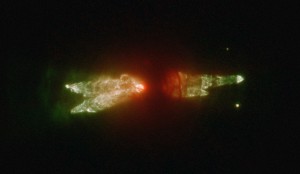Posted by Nicky Drayden on Oct 12, 2014 in
Reviews Strange Horizons
http://www.strangehorizons.com/2013/20131111/salt-f.shtml
Author Website: http://ojcade.com
This is a story of three women, tied together by motherhood, grief, infidelity and salt. Their lives are so interconnected, and yet they are all strangers to one another. Makareta has lost her husband and the father of her three daughters. She has been left to continue the family business of hauling salt across the galaxy to a planet that uses it in a secret birth ritual. Edith has just given birth to twins, a boy and a girl, though before the girl can suckle from her mother’s breast, her first meal must be that of salt, harvested by Edith’s own two hands after a grueling journey, her legs still bloodied and unsteady from so many hours of labor. Miriama is Edith’s lost aunt, banished away from their homelands after a sexual encounter with a man from another world that left her with child. She is old now, and her daughter is grown and is ready to venture out on her own–unsure of why her mother clings to the traditions of the people who shunned her, but the tie of the mythology of salt is strong, both across generations and bloodlines:
Salt was a precious commodity. Scarce, although the pillar endured—partly because the men thought it cursed, a punishment for disobedience, and the women took care not to alter that perception. Other sources were imported. Brought by spaceships from ocean worlds to the desert and too expensive for traditional communities such as Edith’s. So be it, said the elders, who wanted little contact with traders anyway, arguing that they did not understand desert life, and contact with them polluted. It had done so to her mother’s sister, and Edith had been raised on warning tales at the back of the fire, whispered where the men could not hear and spit on her name into the desert. “Miriama was not so much older than you,” her mother had told her, on the night of Edith’s first bleeding. “She fell in love with a man from another world, and gave herself up to him. Of course that was the end of it—tossed out, she was, without so much as a single date, a single cup of water. She gave it all up for salt. I wept into my blankets at night, knowing I would never see her again.” And that was the end of it; the end of interaction and transaction and trade.
It was these strictures Edith thought of first when she arrived at the pillar and saw a strange woman, in foreign trousers and jacket, her head immodestly bare, her chin and lips scarred blue with ink. At first Edith thought she was blowing sand at the pillar, but the quick warm smell of water permeated the air, jolted her out of weariness into feverish dismay.
Her mother’s stories came suddenly back to her: abandonment and disconnection and loss, a life looking back to a sister kept separate forever. At her breast, the baby cried—and the sharp, stabbing fear that her child would be lost as her mother’s sister was lost spurred her into action.
This story is one of subtleties, and I had to reread it to pick up what I missed on the first go-round. It is an interesting commentary on the sacrifices mothers make to keep their families whole, and the secret sub-culture of womanhood that happens under the noses of menfolk. I feel like theses women are tied down by the traditions surrounding salt, but at the same time, it is salt that puts food in their mouths, gives them identity, and ties them together in sisterhood. Will the tradition continue, or will Miriama’s daughter or someone of the like deny her heritage and seek something greater, or at least something different? And will the disconnect from one’s culture eventually drive her back to the comfort of salt?
 REAL Women in Space
REAL Women in Space
Anna Lee Fisher
First mother in space.
STS-51-A (Nov. 8, 1984)
Creative Commons
Tags: Colonies, Short Story, Short Women in Space, Strange Horizons
Posted by Nicky Drayden on Oct 11, 2014 in
Reviews Clarkesworld
http://clarkesworldmagazine.com/mohanraj_06_14/
Author Website: www.mamohanraj.com
Chaurin has left the tunnel-cities of his homeworld to find the remains of his brother, killed at a gaudy human city on the planet Kriti. He doesn’t understand what drove his brother to want to live among the humans, so light and slight, and easy to dispose of. While he is not here to exact his revenge, the thought does cross his mind. He’s more nervous about the state of his brother’s body, six months after his death. Chaurin has gotten here as fast as he could manage, but is devastated when he is presented with the remains in a small box:
Chaurin reached out a hand, and then pulled it back. He’d thought he was prepared, but the shock of seeing the box made his mouth go dry, so that he had to swallow before he could speak. “Is this all there is? Was he . . . cremated?” The word was unfamiliar in Chaurin’s mouth, but he had learned it, just in case. He hadn’t known what he would find on arrival, so had studied human death customs on the long journeys between Jump points. He hadn’t been able to afford a luxury cruise; the clan had barely scraped together enough to buy him passage on a freighter. They had been afraid to wait longer than they had to, afraid of what would happen to Gaurav’s remains.
Amara is one of the humans that had been spared from death due to Gaurav’s bravery. She’s still trying to process the senseless violence and loss of life, and has stepped away from her career in law enforcement to tend to a garden at the memorial site, using her hands to make things grow in Kriti’s stingy soil. When a broad and terse saurian suddenly stands before her, she thinks she’s seeing Gaurav again…no not him, but strikingly similar, and his imposing look suggests he means business.
Mary Anne does an exquisite job weaving together the narratives of these two characters. Each offers a glimpse of the other and the world surrounding them as filtered through their views with all the glory of their cultural baggage. Even more impressive are the turns this story takes. Just when you think you know where it’s going–bam! Didn’t see that coming. The writing is seamless, allowing me to immerse myself in the world, right up until the sad moment I noticed my browser’s scroll bar coming to the end of the page. This is a story of how death and destruction can tie strangers together, even if they’re species from different sides of the cosmos. Some things truly are universal–from the act of bringing life into this world, to the act of commemorating a life extinguished. The customs may be vastly differ on the outside, and they may even seem barbaric filtered through one’s own cultural lenses, but the emotions that rim the heart do no waver. I think it is important to be often reminded that the way one sees things is not the right way, but only a way, so give it a read, or even a re-read. This is one you don’t want to miss.
Tags: Aliens, Clarkesworld, Colonies, Nicky's Pick, Short Story, Short Women in Space
Posted by Nicky Drayden on Oct 9, 2014 in
Reviews Daily Science Fiction
http://dailysciencefiction.com/science-fiction/space-travel/m-e-garber/dancing
Minutes after an explosion kills Arun, beloved father and husband and pilot to their antique spaceship, a mother and daughter are forced to put aside their grief to land the ship and find a way to save both of their lives.
The ship’s belly bumped the ground, rose up, and dove hard. Tearing metal shrieked louder than Natesha. Seema buffeted in her restraints as a series of booms shook what remained of the ship. Then it settled, hissing, to the ground.
She freed herself and raced through the chaos of debris to Natesha, who sagged against her restraints. Trembling hands touched her daughter’s cheek, her neck. A pulse! Natesha’s eyes fluttered. Seema’s clenched body released, and she placed a kiss on her daughter’s bruised forehead.
Tears welled in Natesha’s eyes as Seema’s hands flew over her, loosening her restraints.
“Daddy wouldn’t have crashed us,” her daughter said, then threw herself into her mother’s arms and wept.
We’re instantly thrown into a tear jerker, these two women and a child on the way, set down on a hostile planet whose air will kill them in an hour. All of their emergency lifesuits have been destroyed by the explosion that killed Arun. Mother, Seema, cannot see how life will be possible without her husband, but for the sake of their children, she pushes forth, trying to be strong for their guilt-ridden daughter Netesha.
This piece of flash hold’s its fair share of emotion, and then some. Their reactions rang true, and their anxiety transferred to me as I read along. I felt Seema’s frustration of her daughter refusing to listen, but understood that Netesha was not in a place to make a rational decision of her own. The ending image (without spoilers) is a very powerful one that echoes the relationship between mother and child. My only gripe is that Seema stumbles onto the solution to their problem rather abruptly, and I would have liked it to be more of a natural discovery, but still, this is a very quick and emotionally potent read.
Tags: Daily Science Fiction, Flash Fiction, Short Women in Space, Space Travel


